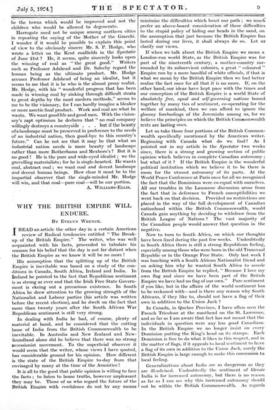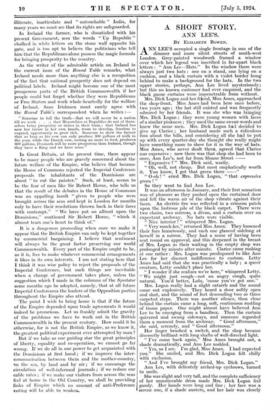WHY THE BRITISH EMPIRE WILL ENDURE.
BY EVELYN WRENCH.
jREAD an article the other day in a certain American review of Radical tendencies entitled " The Break- up of the British Empire." The writer, who was well acquainted with his facts, proceeded to tabulate his reasons for his belief that the day is not far distant when the British Empire as we know it will be no more !
His assumption that the splitting up of the British Empire is inevitable was based on a study of the con- ditions in Canada, South Africa, Ireland and India. In Ireland he pointed to the fact that Republican sentiment is as strong as ever, and that the Irish Free State Govern- ment is ekeing out a precarious existence. In South Africa he drew attention to the growing strength of the Nationalist and Labour parties (his article was written before the recent election), and he dwelt on the fact that more than twenty years after the South African War Republican sentiment is still very strong.
In dealing with India he had, of course, plenty of material at hand, and he considered that the cutting loose of India from the British Commonwealth to be inevitable. In Australia and New Zealand and New- foundland alone did he believe that there was no strong secessionist movement. To the superficial observer it would seem that the writer, whose views I have quoted, has considerable ground for his opinion. How different is the state- of the British Empire to-day from that envisaged by many at the time of the. Armistice !
It is all to the good that public opinion is willing to face the facts ; to listen to home truths, however unpleasant they may be Those of us who regard the future of the British Empire with confidence do not by any means minimise the difficulties which beset our path; we much- prefer an above-board consideration of these difficulties to the stupid policy of hiding our heads in the sand, on the assumption that just because the British Empire -has lasted during our lives, it shall always do so. Let us clarify our views.
If when we talk about the British Empire we mean a London-run world State, as the British Empire was for part of the nineteenth century, a mother-country sur- rounded by its subservient colonies, a great " coloured " Empire run by a mere handful of white officials, if that is what we mean by the British Empire then we had better realise the fact once for all that it is no more. If, on the other hand, our ideas have kept pace with the times and our conception of the British Empire is a world State of absolutely free, equal and self-governing nations bound together by many ties of sentiment, co-operating for the welfare of mankind, then we can afford to ignore the gloomy forebodings of the Jeremiahs among us, for we believe the principles on which the British Commonwealth rests are lasting ones.
Let us take those four portions of the British Common- wealth specifically mentioned by the American writer.
Beginning with Canada what do we find? As I pointed out in my article in the Spectator two weeks since, there is a strong and growing section of public opinion which believes in complete Canadian autonomy ; but what of it ? If the British Empire is the wonderful political institution which we believe it to be there is room for the utmost autonomy of its parts. At the World Peace Conference at Paris once for all we recognized the fact that the Dominions were co-equal with ourselves.
All our troubles in the Lausanne discussion arose from the fact that in deference to French susceptibilities we went back on that decision. Provided no restrictions are placed in the way of the full development of Canadian nationhood within the British Commonwealth, would Canada gain anything by deciding to withdraw from the British League of Nations ? The vast majority of the Canadian people would answer that question in the negative.
Now to turn to South Africa, on which our thoughts have been fixed during the past few weeks. Undoubtedly in South Africa there is still a strong Republican feeling, especially among those who were born in the old Transvaal Republic or in the Orange Free State. Only last week I was lunching with a South African Nationalist friend and on asking him why he wanted South Africa to secede from the British Empire he replied," Because I love my own flag and since we have been part of the British Empire we have had no flag of our own." Pure sentiment if you like, but in the affairs of the world sentiment has to be reckoned with—and is there any reason why South Africans, if they like to, should not have a flag of their own in addition to the Union Jack ?
In Canada, in Quebec Province, I have often seen the French Tricolour at the masthead on the St. Lawrence, and as far as I am aware that fact has not meant that the individuals in question were any less good Canadians. In the British Empire we no longer insist on every Dominion putting the King's head on its stamps. Each Dominion is free to do what it likes in this respect, and in the matter of flags, if it appeals to local sentiment to have a flag. of its own in addition to the Union Jack, surely the British Empire is large enough to make this concession to local feeling.
Generalizations about India are as dangerous as they are ill-advised. Undoubtedly the sentiment of literate India is for increased autonomy, but there is no reason as far as I can see why this increased autonomy should not be within the British Commonwealth. As regards illiterate, inarticulate and " untouchable " India, for many years we must see that its rights are safeguarded.
In Ireland the farmer, who is dissatisfied with his present Government, sees the words " Up Republic " chalked in white letters on the stone wall opposite his gate, and is too apt to believe the politicians who tell him that the Republicans alone possess the magic formula for bringing prosperity to the country.
As the writer of the admirable article on Ireland in the current issue of the Round Table remarks, what Ireland needs more than anything else is a recognition of the fact that national prosperity does not depend on political labels. Ireland might become one of the most prosperous parts of the British Commonwealth if her people could but forget whether they were Republicans or Free Staters and work whole-heartedly for the welfare of Ireland. Sane Irishmen must surely agree with the Round Table's correspondent when he writes :— " Someone to tell the truth—that we will never be a nation till we work . . .; that Monarchies or Republics do not of them- selves bring prosperity or riches in their train ; that Ireland has now her future in her own hands, room to develop, freedom to expand, opportunity to grow rich. Someone to show the farmer that as long as his cow can only produce 300 gallons of milk in the year, while the Danish cow, costing no more to feed, produces 600 gallons, Denmark will be more prosperous than Ireland, though they have a King and we have none."
In Great Britain, at the present time, there appear to be many people who are gravely concerned about the future welfare of the Empire, who believe that because the House of Commons rejected the Imperial Conference proposals the inhabitants of the Dominions are about " to cut the painter." Such, at least, seems to be the fear of men like Sir Robert Home, who tells us that the result of the debates in the House of Commons was an appalling insult " given to people who were brought across the seas and kept in London for months only to have their resolutions thrown back in their faces with contempt." " We have put an affront upon the Dominions," continued Sir Robert Home, " which it almost tears one's heart to think of."
It is a dangerous proceeding when once we .make it appear that the British Empire can only be kept together by commercial bargaining. I believe that sentiment will always be the great factor preserving our world Commonwealth. Every part of the Empire ought to be, as it is, free to make whatever commercial arrangements it likes in its own interests. I am not stating here that I think it was wise policy to reject the proposals of the Imperial Conference, but such things are inevitable when a change of government takes place, unless the suggestion which I made in the columns of the Spectator some months ago be adopted, namely, that at all future Imperial Conferences the leaders of the Opposition parties throughout the Empire also attend.
The point I wish to bring home is that if the future of the Empire depended upon trade agreements it would indeed be precarious. Let us frankly admit the gravity of the problems we have to work out in the British Commonwealth in the present century. How could it be otherwise, for is not the British Empire, as we know it, the greatest political experiment ever attempted by man ?
But if we take as our guiding star the great principles of liberty, equality and co-operation, we cannot go far wrong. If we do all in our power to get acquainted with the Dominions at first hand ; if we improve the inter- communication between them and the mother-country, on the sea, by land and by air ; if we encourage the circulation of well-informed journals ; if we reduce our cable rates ; if we make our visitors from across the seas feel at home in the Old Country, we shall be providing links of Empire which no amount of anti-Preference voting will be able to weaken.



















































 Previous page
Previous page